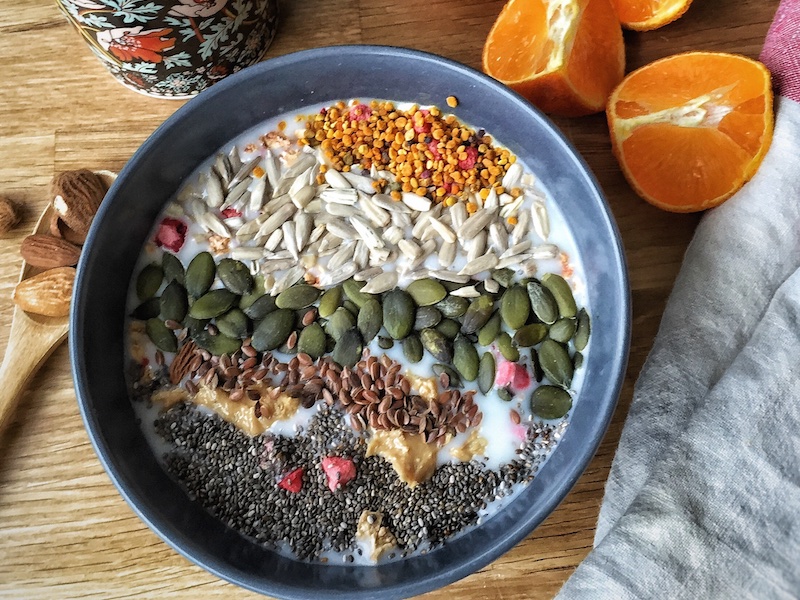Menopause is a natural and inevitable part of our hormone journey and yet is a subject we are so rarely educated on. Most know of the common side effects such as hot flashes and mood swings, but there are many effects that don’t get the needed attention.
Most importantly, what is least discussed is what you can do to give yourself a bit of relief. Unfortunately, I can’t promise a magical cure to all hormone-related struggles, but you certainly don’t have to grin and bear it without help, like so many feel forced to do. One of the most powerful tools at our disposal is nutrition because there are vitamins and minerals in everyday foods that help boost hormones that have dropped due to menopause or help to lessen the side effects caused by it. Some of my clients have found benefits from Hormone Replacement Therapy but still feel a lot of menopause symptoms and that means nutrition choices can be a great way to address those remaining struggles. By making mindful choices about what we eat, we can positively impact our hormonal health and alleviate the discomforts that often accompany menopause.
Drops in Oestrogen – Phytoestrogens
Phytoestrogens are basically plant-based compounds that mimic oestrogen in our bodies. As well as reproductive health and menstrual cycle regulation, Oestrogen is responsible for mood regulation, bone health, cognitive function and many other vital bodily functions. Therefore as your natural oestrogen levels decrease during menopause, you can experience hot flashes, vaginal dryness, night sweats, sleep disturbances, difficulties with memory and concentration, osteoporosis, anxiety, cardiovascular difficulties and more. As this happens, phytoestrogens can step in and help balance out your hormonal activity. There are many options to incorporate phytoestrogens into your diet such as soy products like tofu and tempeh, flaxseeds, sesame seeds, beans, lentils, oats and more. This means that a tofu stir-fry, lentil or bean stew and a porridge sprinkled with seeds are all great ways to give your oestrogen levels a helping hand.
Joint Pain, Limited Mobility and Injuries – Calcium and Vitamin D
During menopause, the risk of bone loss increases due to hormonal changes in your body. This can lead to joint pain, limited mobility and a greater risk of injury. This is one of those problems that doesn’t seem like a problem until you’re really suffering, so giving your body what it needs preemptively to support bone health and strength is essential. Two big players for this are calcium and vitamin D, they are crucial for maintaining bone density.
Great sources of calcium include dairy products such as milk, cheese and yoghurt. Or if you’re looking for plant-based options then you can opt for tofu, tempeh, sesame seeds, fortified plant-based milk (such as almond, soy, or oat milk) and leafy green vegetables (such as kale, spinach and broccoli).
In terms of vitamin D, sunlight is the greatest source. Many people find it difficult to get enough time outside for that sunlight because of their work or sometimes the weather isn’t quite the sunny paradise we hope for. In that case, then you may want to speak to your healthcare professional about whether supplements would be suitable. But there are many options food-wise to give yourself a natural boost. For example, fatty fish such as salmon, mackerel, trout and sardines are some of the best natural sources of vitamin D, and many foods are fortified with Vitamin D such as plant-based milk, orange juice, cereals and dairy products.
This gives you a wide range of options to try, such as starting your day with yoghurt and orange juice, adding spinach and cheese to your omelette or trying salmon and broccoli pasta.
Joint Pain, Mood Swings and Heart Health – Omega-3
A great way to alleviate joint pain, mood swings and support overall heart health during menopause is with Omega-3. Omega-3 fatty acids are healthy fats with anti-inflammatory properties. Similar to vitamin D, fatty fish are a wonderful source of Omega-3, making them a great all-around inclusion in your meals for hormonal health benefits. Chia seeds, flaxseeds, walnuts and hemp seeds are also good sources of Omega-3. These ingredients are great not only because they also give you fibre and protein, but because of how easily they can be incorporated into so many meals. I recommend keeping small containers on hand at all times and sprinkling them into yoghurts, cereals, porridge, smoothies, salads, sandwiches, baked goods and basically anything you fancy!
Fatigue and Mood Swings – B Vitamins
A very common experience during menopause is a lot of fatigue and mood swings, which is very understandable considering the drastic change in hormone levels. B vitamins, especially B6 and B12, play a vital role in mood regulation and energy metabolism. If you want your meals to be rich in B vitamins then you have a wide range of choices including poultry (such as chicken and turkey), lean cuts of meat (such as beef tenderloin, pork tenderloin and lamb loin or leg) and eggs. Or for the plant-based options you have whole grains (such as brown rice, quinoa, whole wheat bread and pasta, oats and barley) and leafy greens. Maybe start your day with scrambled eggs and spinach on whole wheat toast or finish it with some beef and broccoli on brown rice.
Cramps, Trouble Sleeping and Anxiety – Magnesium
Magnesium supports muscle function, sleep, and relaxation, which means that during menopause, magnesium can help ease muscle cramps, promote better sleep, and reduce anxiety. You’ll find magnesium in nuts (such as almonds, cashews, brazil nuts and hazelnuts), seeds (such as pumpkin, sunflower, sesame, chia, hemp and flax seeds) and dark leafy greens (such as spinach, chard, kale and beet greens). Your greens can be added to smoothies or a quick and easy way to add them to your meals is to saute them with a bit of lemon juice. If you have those days where you want to give your body a boost and some nutrients but you’re struggling to find time to cook yourself a meal, then nuts and seeds are a perfect snack to have throughout the day.
Menopause is not a time to suffer in silence and without control. Try to allow yourself some compassion and explore what options there are to bring yourself some physical and emotional peace. Sometimes taking vitamin supplements can be a helpful way to give an extra boost to the difference these essential nutrients provide, so you can choose to utilise both or just one. It’s not about getting it perfect every day, the beauty of food is the endless possibilities to experiment with what you enjoy most and what fits in with your lifestyle. Every person’s experience with menopause is unique, so the way that you deal with it will be unique as well. Try to use nutrition as a tool to help your body instead of strict rules to restrict and punish yourself with.
Here is a shopping list of everything mentioned above, the starred items are foods that go the extra mile and help with more than one menopausal side effect. You can customise it to your preferences and dietary requirements for your next grocery shop:
Proteins:
*Tofu
*Tempeh
*Salmon
*Mackerel
*Trout
*Sardines
Chicken
Turkey
Beef tenderloin
Pork tenderloin
Lamb loin or leg
Eggs, Dairy and Drinks:
Almond, soy or oat milk
Milk
Cheese
Yoghurt
Eggs
Orange juice
Vegetables:
*Kale
*Spinach
*Chard
*Beet greens
Nuts and Seeds:
*Flaxseeds
*Sesame seeds
*Chia seeds
*Hemp seeds
*Pumpkin seeds
*Sunflower seeds
*Walnuts
Almonds
Cashews
Brazil nuts
Hazelnuts
Whole Grains and Pantry:
*Oats
Brown rice
Quinoa
Whole Wheat Bread
Whole Wheat Pasta
Barley
Fortified Cereal
Lentils
Beans (black beans, kidney beans, etc)
About the author

Jess Forster is a Holistic Health & Wellness Specialist and Founder of Empowered Health Education. As a licensed yoga teacher with qualifications ranging across nutrition, physical training, mental health and hormone management, Jess works with her clients to map out and execute a balanced health plan that addresses the full picture. She is dedicated to empowering individuals to take control of their own well-being through education, support and personalised guidance. She specialises in providing a practical, realistic and compassionate approach to health, with an emphasis on understanding and supporting the different needs of an individual, instead of a one-size-fits-all mindset.
Connect with Jessica Empowered Health Education | Linkedin |. Instagram









